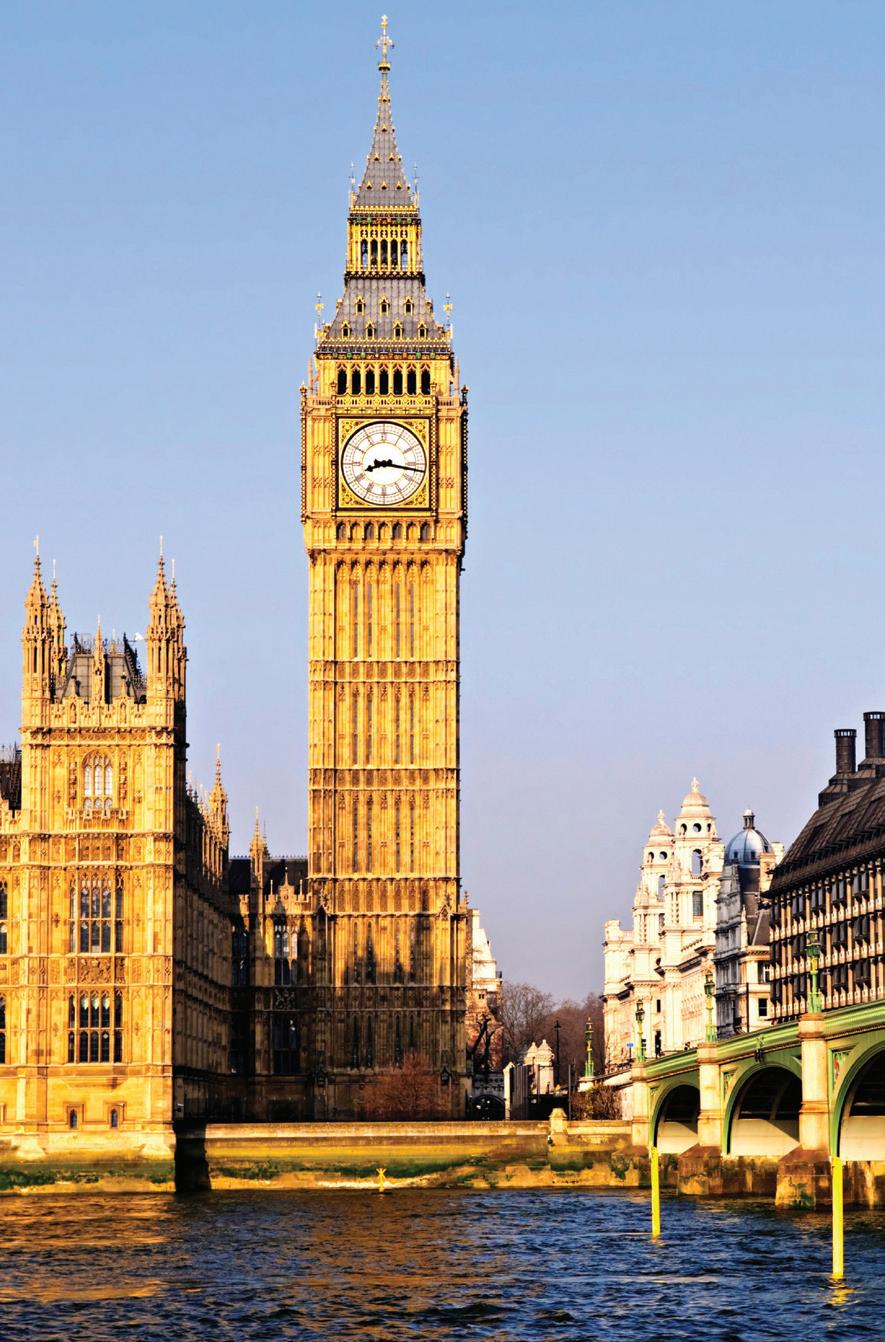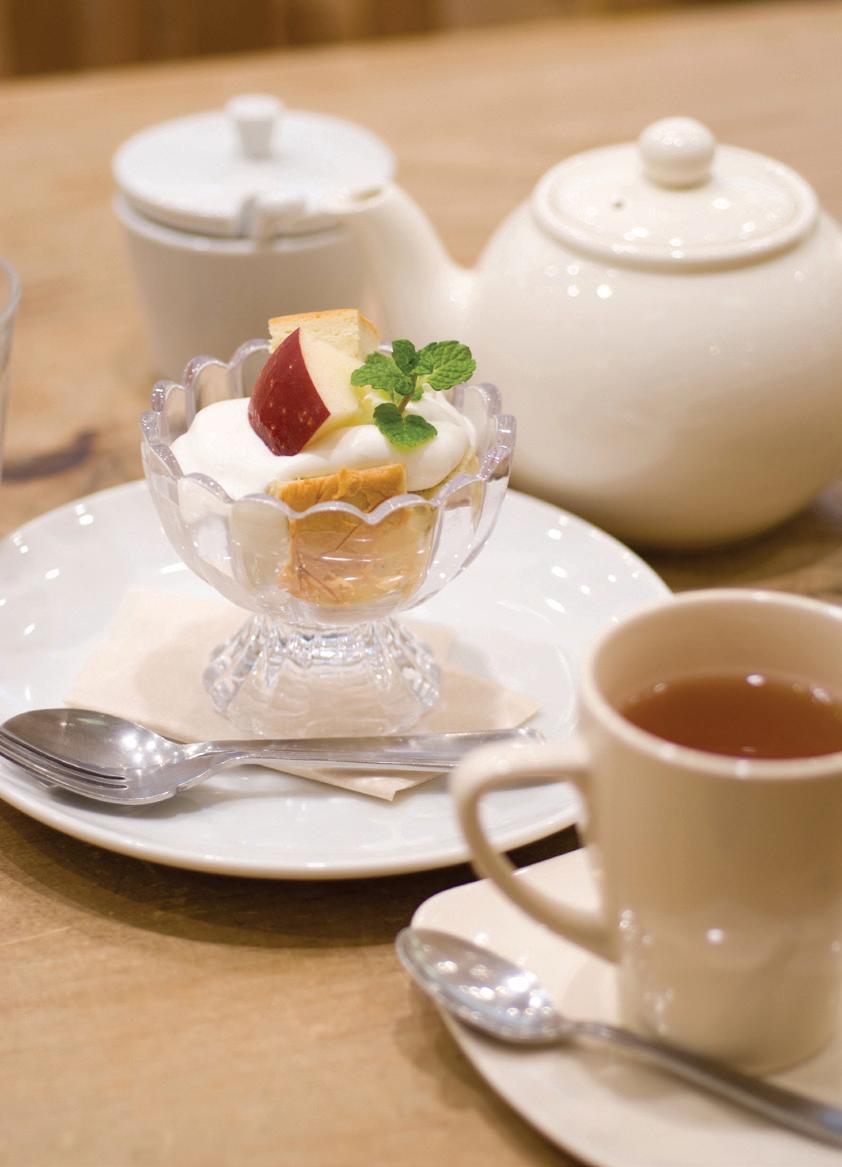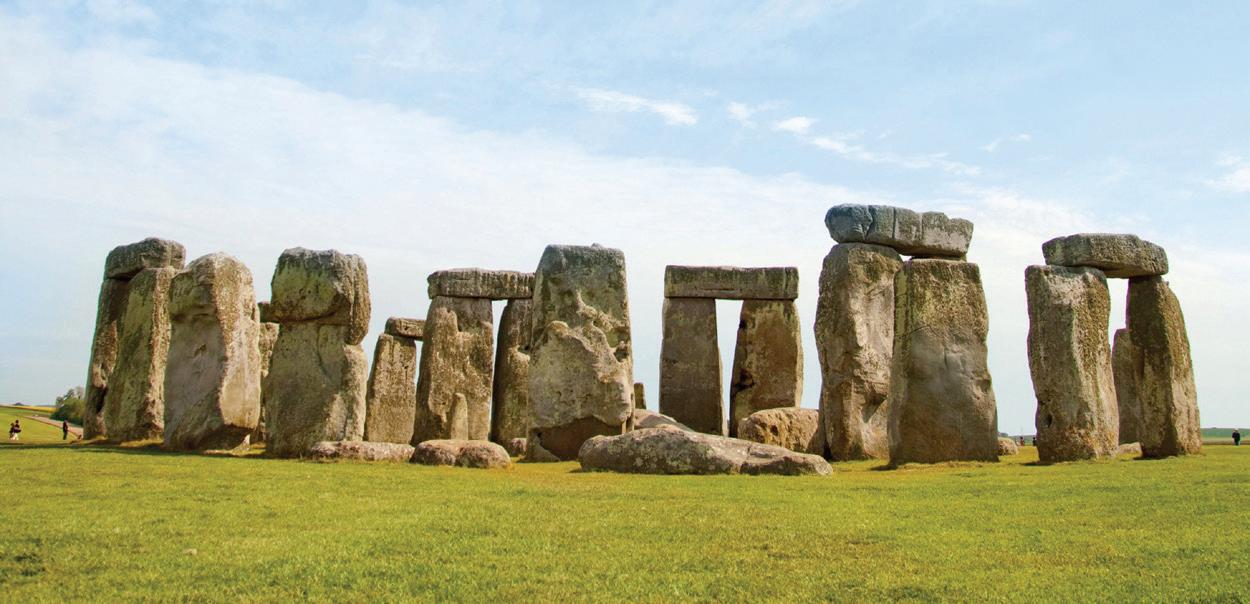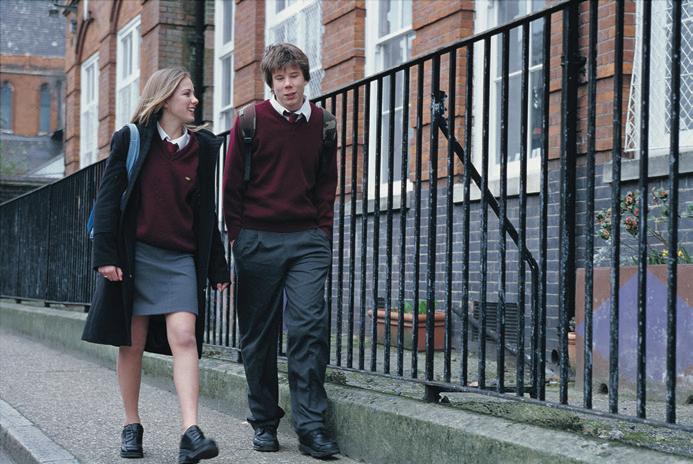
9 minute read
What is Britain famous for?
WHAT IS GREAT BRITAIN FAMOUS FOR?
READING
Advertisement
Track 1
Great Britain is famous for many things: its long history, its Royal Family, its well-known scientists, writers, artists, pop stars, sports personalities, and its Scottish kilts and pipes. However, we mustn’t forget London’s red double-decker buses, Wimbledon and the country’s massive cathedrals and legendary sites, either. It is also famous for its breakfast, its afternoon tea, its pubs, the legend of Robin Hood, and numerous other things.
BIG BEN
Big Ben is one of London’s best-known tourist landmarks. It looks really spectacular at night when the clock faces are illuminated. The name ‘Big Ben’ actually refers not to the clock-tower, but to the huge thirteen tonne bell that sounds every hour. The clock is famous for its accuracy. It has slowed down only once – on New Year’s Eve 1962 because of heavy snow, causing it to ring in the New Year 10 minutes late.
The bells of the Great Clock rang out across London for the first time in 1859, and Parliament had a special sitting to decide on a suitable name for the great hour bell. During the debate, Sir Benjamin Hall, a large, heavy man known by the nickname ‘Big Ben’, stood up and gave an impressive, long speech on the subject. When he finished, someone shouted out: “Why don’t we call it Big Ben?” That’s how the bell got its name. At least, this is the most commonly accepted story.
AFTERNOON TEA

It is not a drink, but a small meal consisting of tea (or coffee) served with either delicious sweet food, such as biscuits and cakes, or sandwiches with cold meat, cheese on toast, etc. Nowadays, most ordinary British families do not have time for afternoon tea at home, but in the past it was a tradition that became popular one hundred and fifty years ago, when rich ladies invited their friends to their houses for an afternoon cup of tea and started offering their guests sandwiches and cakes, too.
FOOTBALL

Football is the most popular sport in England and offers everyone the chance to have fun, from children kicking a ball around in the school playground, to pub teams playing in parks on a Sunday afternoon, and the rich professionals playing in front of 40,000 spectators. In 1848, England was the first country to develop a set of rules for football, and the Football League, established in 1888, was the first professional football league in the world. Thehighlight of the English football season is the FA Cup Final each May, and Manchester United is one of the most successful clubs in English football history.
STONEHENGE

This ancient stone circle is one of the wonders of the world. Without doubt, it is one of the mostamazing prehistoric monuments and a complete mystery. We will never know why hundreds of peoplestruggled for thousands of years to build it. Some people suggest that it was used for astronomical observation or religious rituals.
Glossary
numerous –many, large in number to illuminate – to light up spectacular – very impressive delicious – tasty to establish – to start a company or organization; to set up
COMPREHENSION
1 Answer the following questions according to the information in the text. 1. How did Big Ben get its name? 2. When does the clock look especially nice? 3. How did the tradition of afternoon tea start? 4. What is served as afternoon tea? 5. Why is football so popular in Great Britain? 6. What is the biggest football event in England? 7. What are the possible reasons for the building of Stonehenge?

VOCABULARY
a c b
1 Can you guess the meanings of the highlighted words from the context? If necessary, use a dictionary to check the exact meaning. Then match the words with their definitions below and write them down.

1. the best or most exciting, interesting part _____________ 2. very surprising _____________ 3. a building or feature which is easily noticed ______________ 4. to try hard to do something _____________ 5. correct even in small details ______________ 6. right and proper _________________ 7. people who watch an activity, especially a sporting event _________________
2 Complete the gaps using the words below in the correct form.
illuminate huge amazing struggle accuracy establish highlights spectator
1. The people of that country will continue in their ______________for independence. 2. The streets were ________________ with coloured lights. 3. His last three films have all been _______________ successes. 4. I think that ________________of the matchwill be shown after the news. 5. It’s ______________ what the boy can do when he wants to. 6. Unfortunately, they could not guarantee the _____________ of the figures. 7. My grandfather ________________ the family business in 1960. 8. They won 4-0 in front of 40,000 cheering ______________.
3 Match the words in column A to their opposites in column B.
A
1. ancient 2. illuminate 3. amazing 4. delicious 5. suitable 6. numerous
B
a. few b. tasteless c. wrong/not proper d. ordinary e. modern f. darken
4 Use the words from list A to make sentences.
Example: It’s amazing how clever dogs can be.
10 PREPOSITIONS of TIME
Study the use of prepositions and then do the exercise below. 1. We use IN before periods of time: parts of the day • months • seasons • years • decades and centuries I’ll see you in the morning. / I’m going to London in July. 2. We use ONbefore particular days and dates. I’ll phone you on Monday. / We’re having a party on New Year’s Day. 3. We use ATbefore exact times • public holidays/festivals The bus leaves at 9.30. / I’m going to Rome at Easter. • in certain phrases: She works at night. / I play tennis at the weekend.
Complete the sentences by using the correct preposition from the box.
at on in
1. I will meet you at the office ________ six o’clock sharp. 2. It will all be over ________ five minutes. 3. We are going to try to set off ________ daybreak. 4. I’ll see you ________ the beginning of the week. 5. The swallows leave the country ________ autumn. 6. The family are all gathering again ________Christmas. 7. I can’t tell you the results ________ the moment. 8. I’m sorry I can’t come as I have an appointment ________Thursday________ 2.30.

WORD FORMATION
MAKING ADJECTIVES
AStudy the list of suffixes used to make adjectivesfrom verbs and nouns. B Make adjectives using the given suffixes, making any necessary changes to the base word and being careful with spelling.Example: offend – offensive C Make sentences using the adjectives from box B. Example: Most people found the play horribly offensive.
A
Suffix B C
Adjective Make adjectives of these words in the same way.
-ive -ical -ous -able -al attractive biographical famous suitable professional impress _____________ astronomy _____________ marvel _____________ honour _____________ practice _____________ mass ____________ sociology ___________ mystery ____________ avoid ____________ tradition ____________
GRAMMAR
REVISION OF THE PRESENT SIMPLE AND THE PRESENT CONTINUOUS TENSES
1 Identify the tenses in the sentences (1-9) and match them with the uses (a-i). For more information, see the Grammar summary.
1. She rarely visits her grandparents. 2. She is moving house next week. 3. Her bus arrives at 8 p.m. tonight. 4. Our summers are getting warmer and warmer. 5. I think you are right. 6. They live in a very nice flat. 7. Water freezes at 0 ° C. 8. I’m working at a sports shop this week only. 9. She is entertaining some guests at the moment. a. for a situation that we see as permanent b. to talk about repeated actions c. to talk about plans and arrangements d. for something happening now e. to express the future when it is a part of a timetable f. to talk about scientific facts g. for a situation that we see as temporary, for a short period h. for thoughts, feelings and states (facts) i. to describe things which are changing
2 Insert the appropriate verb form: the present simple or the present continuous. 1. She ______________ (sit) and _____________ (watch) a video, although she never ____________ (do) this when her husband ______________(be) at home. 2. My parents_______________ (have) a long conversation; I _______________ (wonder) what they __________________ (talk) about. 3. I ______________ (think) I can hear her. She ______________(talk) on the phone in the next room. 4. We ___________ (sit) here today because there___________(be) no heating in my room. 5. I _____________ (go) to the concert tonight. I ______________ (not/go) very often because I can’t afford it. 6. My mother ______________ (bake) a cake at the moment. She always _____________ (do) that for my birthday. 7. I ____________________(really/enjoy) myself at this party. I _____________ (want) to stay to the end.
3 Make sentences by putting the verbs into the present simple or present continuous. Add any other words that you need. 1. my mother / always / tell / me / clean / my room 2. population / in Serbia / grow / older 3. we / save / money / a holiday / this year 4. why / you / wear / funny / hat / today? 5. how often / she / watch / MTV / evening? 6. at the moment / Susan / share / a flat / school-mate
11
4 In pairs, talk about what you do/don’t do in your free time. what you are doing this weekend. what you sometimes do on Sundays. what you never do in the evening.

12 LISTENING
Track 2 My Daily Routine
Listen to three people (Stella, Helen and Peter) talking about their daily routines and do the exercises below. 1 Match the people and their daily activities.
Stella
Peter
Helen a. goes out with friends. b. uses the computer at school.
c. has to register every morning. d. helps with the housework. e. works with small children. f. doesn’t like getting up early.
2 Find mistakes in the following statements and correct them.
1. Stella likes going to school by bus. 2. Stella goes on a date with her boyfriend almost every day. 3. Peter has to wear a uniform at school. 4. Helen has English first class every day. 5. Peter thinks his daily routine is boring. 6. Helen goes on a course to study French.

3 Listen again and check your answers.
WRITING
Write a short composition describing your daily routine. • Say what you usually do in the morning/afternoon (when you are not at school) and in the evening; mention what (if anything) you would like to be different and what you enjoy doing most. • While writing, pay attention to punctuation and spelling, grammar and the use of adverbs of time. (See page 6, exercise 3 in the Workbook.)






